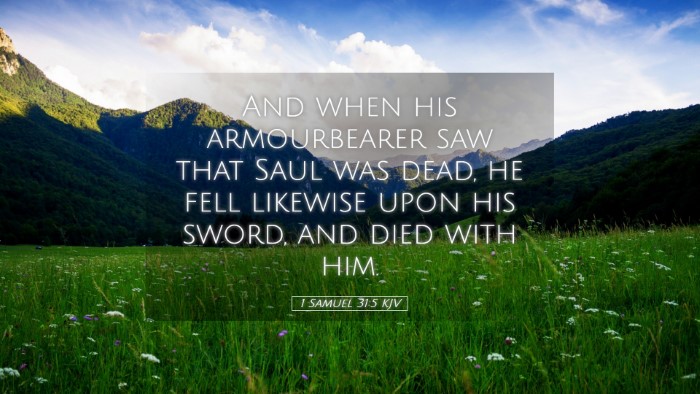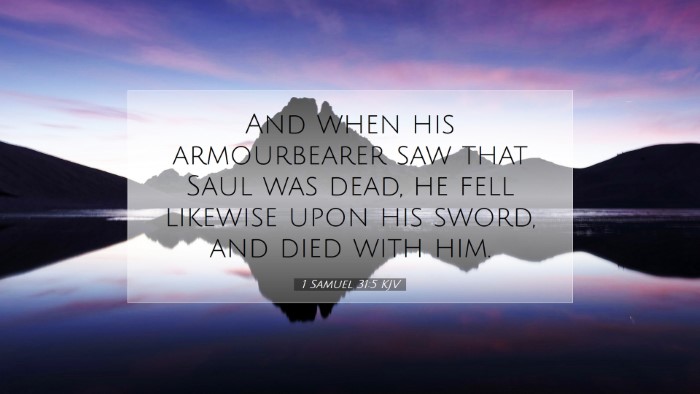Commentary on 1 Samuel 31:5
Verse Context: 1 Samuel 31:5 recounts the tragic end of King Saul, the first monarch of Israel. After being critically wounded in battle against the Philistines, Saul takes his own life. This verse reads: "And when his armor-bearer saw that Saul was dead, he fell likewise upon his sword, and died with him."
General Observations
This verse marks the culmination of Saul's troubled reign and sets a solemn tone for the transition of leadership in Israel. It encapsulates themes of despair, loyalty, and the consequences of divine judgment.
Insights from Commentaries
Matthew Henry's Commentary
Matthew Henry emphasizes the tragic nature of Saul's death as a consequence of his disobedience to God. According to Henry, Saul's downfall was a result of his persistent rejection of God’s commands, leading to divine abandonment. His suicide is portrayed not merely as an act of desperation, but as a final, tragic declaration of his failure as a king.
- Loyalty of the Armor-Bearer: Henry notes the profound loyalty demonstrated by Saul’s armor-bearer, who chose to die alongside his master rather than endure the shame of captivity. This reflects deep-seated values of honor and fidelity in ancient cultures.
- Theological Implications: Henry cautions readers about the severe consequences of turning away from God. Saul's demise serves as a stark reminder of the importance of faithfulness and obedience to divine will.
Albert Barnes' Commentary
Albert Barnes provides a detailed account of the events leading to Saul's death, analyzing both the political and spiritual ramifications. He highlights the immediate psychological impact on Saul after three devastating blows—the loss of his sons, his own injuries, and the tactical defeat by the Philistines.
- Psychological Despair: Barnes suggests that the gravity of Saul's situation led him to perceive death as a preferable alternative to a living disgrace. His decision to end his life reflects a deep-seated despair that is often overlooked in discussions surrounding his character.
- Armor-Bearer's Actions: Similar to Henry, Barnes praises the armor-bearer's loyalty, interpreting his subsequent suicide as a manifestation of the bond between a leader and his servant. This highlights ancient values where personal loyalty often eclipsed personal survival.
Adam Clarke's Commentary
Adam Clarke offers a more analytical perspective, examining the cultural and historical context surrounding Saul's death. He delves into the significance of warfare in the ancient Near East and how such circumstances dictated the actions of leaders and their subordinates.
- Cultural Context: Clarke elaborates on the concept of death in battle and honor in ancient culture, indicating that for many, including Saul and his armor-bearer, dying in battle was often seen as preferable to the disgrace of capture.
- Philosophical Reflections: Clarke argues that Saul's death serves as a commentary on the fleeting nature of power and success, illustrating that a powerful king can rapidly become a cautionary tale if he strays from divine righteousness.
Thematic Reflections
Despair and Honor
The juxtaposition of despair and honor permeates this passage. Saul's tragic fall from power illustrates the gravity of unrepentance and the chaotic consequences of abandoning God's will. The armor-bearer's choice reflects the idea that some values transcend personal safety, emphasizing the themes of loyalty and honor even in dire circumstances.
The Nature of Leadership
This narrative poses vital questions regarding leadership and responsibility. A leader’s fate has repercussions not only for themselves but also for those loyal to them. Saul's demise signals the end of his legacy, emphasizing the need for God-centered leadership to avoid similar fates.
Divine Judgment
Ultimately, Saul’s death is a stark depiction of divine judgment. The decision-making paths that led to his demise serve as a theological reminder for readers of the weighty consequences that follow leadership devoid of divine guidance. The verse stands as a testament to the warnings found throughout Scripture regarding fidelity to God.
Conclusion
The death of Saul, as recorded in 1 Samuel 31:5, is rich with meaning for contemporary readers. It serves not only as a historical account but also as a profound moral lesson on the importance of faithfulness to God, the loyalty between a leader and their followers, and the potential for grave outcomes when one strays from divine commandments. As pastors, students, and theologians reflect on this verse, they are encouraged to draw applications that resonate with modern leadership and discipleship.


